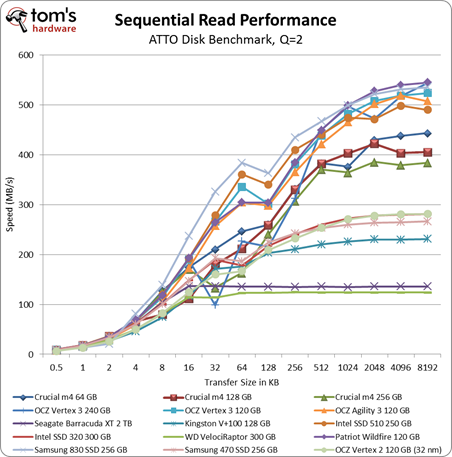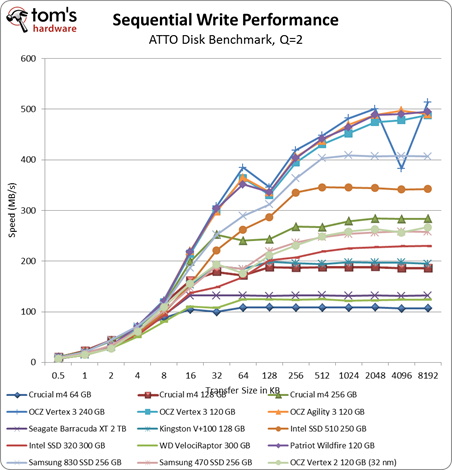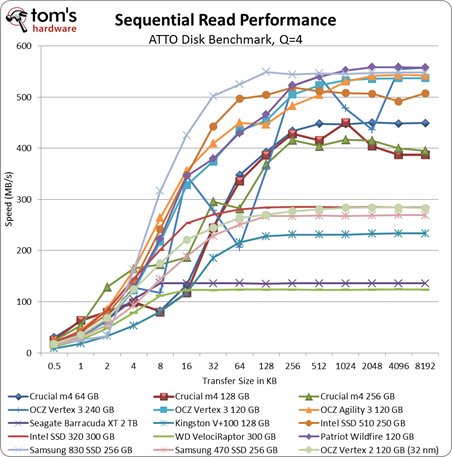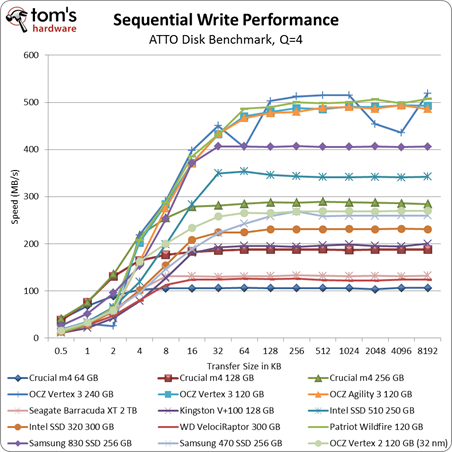Samsung Goes 6 Gb/s: Is The 830-Series SSD King Of The Hill?
Sequential Performance Versus Transfer Size
All of our sequential transfer tests in Iometer are run at a queue depth of one in order to represent the most typical desktop workloads. It's not hard to imagine a situation where an enthusiast might subject an SSD to higher queue depths, though. And indeed, that's where an SSD really stands apart from a conventional hard drive.
Here we're using ATTO to test the sequential reads/writes over 2 GB, starting with a queue depth of two. Why only a queue depth of two? Even when you're pushing more taxing workloads, I/O commands are handled so much faster on an SSD that queue depths higher than two or three are far less common on an average desktop.
The other reason to use ATTO is its ability to easily test different transfer sizes. While 128 KB is fairly standard for measuring sequential performance, larger or smaller transfers are of course still relevant.
Using a queue depth of two, we finally see the 256 GB 830 edge ahead of the 250 GB SSD 510, which is known for its sequential alacrity. There is, however, a margin of only 10 MB/s in Samsung's favor.
When we turn to sequential writes, we see the 830 struggle a bit compared to some of the other drives. Second-gen SandForce drives, in particular, pick up speed versus our tests with a queue depth of one. The Samsung 830 follows closely behind though, and it finished first amongst the SSDs not based on SandForce's technology.
The 256 GB Samsung 830 continues to dominate read performance even after we turn up the queue depth to four. But again, Samsung doesn't have a big advantage. Overall, we're still looking at performance similar to Intel's SSD 510. The difference is that the 830 runs 10-20 MB/s faster for transfer sizes between 32 KB and 256 KB.
Samsung's 830 is the odd ball in this test. Most drives tend to have better performance when we turn up queue depths. However, the 256 GB 830 actually drops as much as 100 MB/s when we push larger transfer sizes.
Get Tom's Hardware's best news and in-depth reviews, straight to your inbox.
Current page: Sequential Performance Versus Transfer Size
Prev Page Benchmark Results: 128 KB Sequential Performance Next Page PCMark 7: Storage Suite-
pbrigido With all of these fast SSDs coming to market, I can only hope that the competition starts to drive down prices soon.Reply -
I still opt for the M4 in all the enthusiast builds I do!Reply
It boils down to reliability, not one hiccup on M4 yet (or any crucial drive Ive installed), 4/5 Sandforce drives I have installed have had some form of callback problem to resolve once deployed, mostly requiring firmware updates, but a few failed drives as well!
Mind you, still better than the early Corsair force Series I used, every single one failed! Stopped using them quick!
Am tempted by OCZ, once they have reliability on their side I will give them a go again! -
Would love to see an article addressing Sandforce controller problems people have been experiencing.Reply
-
mark_hamill Would love to see an article addressing Sandforce controller problems people have been experiencing.Reply -
JamesSneed Looks like a really nice SSD. Samsung has one of the best validation proceses along with Intel and Crucial so I really don't expect people to have issues like they do with OCZ drives. Now the real question how much will it be on the egg?Reply
I saw this quote below in the summary and laughed as nobody in there right mind would use a basic MLC drive in a database server. So Samsung tuned the drive for what it will be used in ,desktops, good.
"Although we'd probably think twice before picking this as our first choice for a database server, it does just fine in an enthusiast's machine." -
JohnnyLucky great review. now we just have to wait and see how the ssd will hold up over the long haul. If it is anything like the 470, then it should be problem free.Reply -
beenthere We'll see how this series of Samsung SSDs fair. The previous gen was a nightmare of problems so I don't think Samsung's validation process is any better that the rest of the SSD suppliers - which is sad when Samsung controls everything including NAND production. It's amazing that we still have SSDs NOT readt for Prime Time.Reply -
AppleBlowsDonkeyBalls beenthereWe'll see how this series of Samsung SSDs fair. The previous gen was a nightmare of problems so I don't think Samsung's validation process is any better that the rest of the SSD suppliers - which is sad when Samsung controls everything including NAND production. It's amazing that we still have SSDs NOT readt for Prime Time.Reply
Proof? I think you just pulled this out of your ass or from someone's that told you some story. The 470 series was VERY reliable.



